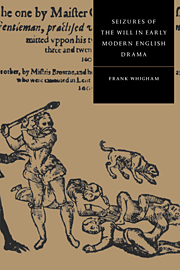Book contents
- Frontmatter
- Contents
- Acknowledgments
- Abbreviations
- Introduction
- 1 Forcing divorce in The Spanish Tragedy
- 2 Hunger and pain in Arden of Faversham
- 3 The ideology of prodigality in The Miseries of Enforced Marriage and A Yorkshire Tragedy
- 4 Sexual and social mobility in The Duchess of Malfi
- Afterword
- Notes
- Works cited
- Index
3 - The ideology of prodigality in The Miseries of Enforced Marriage and A Yorkshire Tragedy
Published online by Cambridge University Press: 17 August 2009
- Frontmatter
- Contents
- Acknowledgments
- Abbreviations
- Introduction
- 1 Forcing divorce in The Spanish Tragedy
- 2 Hunger and pain in Arden of Faversham
- 3 The ideology of prodigality in The Miseries of Enforced Marriage and A Yorkshire Tragedy
- 4 Sexual and social mobility in The Duchess of Malfi
- Afterword
- Notes
- Works cited
- Index
Summary
… being Wives,
They are Sovereigns: Cordials that preserve our Lives,
They are like our hands that feed us, this is clear,
They renew man, as spring renews the year.
(Miseries 142–45)O Gentlemen, I am undone, I am undone, for I am married, I that could not abide a Woman, but to make her a whore, hated all She-creatures, fair and poor, swore I would never marry but to one that was rich, and to be thus cunnicacht.
(Miseries 2158–60)A perilous gash, a very limb lopped off.
(Henry IV Part One 4.1.43)In 1605 mass murderer and former ward Walter Calverley was pressed to death, refusing to plead guilty or innocent for trying to annihilate his family. His violent story caught the public eye, and two pamphlets, a ballad, and two plays appeared in the next three years. Three of these texts survive: the first pamphlet, the anonymous Two Most Unnatural and Bloodie Murthers (1605), George Wilkins's play The Miseries of Enforced Marriage (1607), and A Yorkshire Tragedy (1608), by “William Shakespeare,” as the title page has it. Contrary to common assumption, this discursive field does not center on Wilkins's famous titular rubric: in Calverley's life, in Murthers, and in A Yorkshire Tragedy the marriage in question is not enforced. Enforcement is Wilkins's crucial defining supplement to the story, amplifying and focusing its lines of force. I propose to follow Wilkins's refraction of Walter Calverley's violence across an extended spectrum of family practices.
- Type
- Chapter
- Information
- Seizures of the Will in Early Modern English Drama , pp. 121 - 187Publisher: Cambridge University PressPrint publication year: 1996



